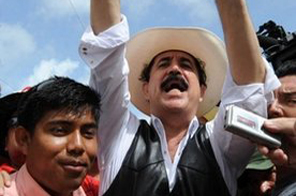Zelaya retreats after brief return
LAS MANOS: Faced with international calls for restraint, ousted Honduran President Manuel Zelaya has retreated from the Honduran-Nicaraguan border after briefly setting foot into his country.
Zelaya's symbolic attempt to return home on Friday came almost a month after soldiers sent him into exile.
Clashes between anti-riot police firing tear gas and hundreds of Zelaya supporters, some wielding stones, erupted on the Honduran side of the border as the beleaguered leader arrived just meters away in Nicaragua.
Surrounded by a throng of supporters and media, Zelaya, wearing a leather waistcoat and his trademark cowboy hat, stepped into Honduras briefly before returning to Nicaragua.
He retreated further from the border area later in the day and was expected to spend the night in the Nicaraguan town of Ocotal.
During the crossing, Zelaya told a Honduran army official that he wanted to speak to the head of the army, General Romeo Vasquez.
Soldiers expelled Zelaya from the country at gunpoint on June 28 in a move supported by Honduras's courts and legislature as he sought to hold a referendum on changing the constitution.
In Honduras, soldiers blocked Zelaya's wife from joining the ousted leader, Xiomara Castro de Zelaya told Telesur by phone.
While international television broadcast Zelaya's return, Honduran channels made no mention of it, instead showing regular programs.
By nightfall, supporters in Honduras were losing faith that Zelaya would enter the country as promised.
Several of the president's supporters said they were exhausted after 10 days of talk about his return. Many had walked long distances to reach the border area.
Meanwhile, Honduran soldiers, many wearing ski masks, continued to reach the border area.
US Secretary of State Hillary Clinton criticized Zelaya's move as "reckless," while the State Department said the president planned to travel to Washington on Tuesday for talks.
"President Zelaya's effort to reach the border is reckless. It does not contribute to the broader effort to restore democracy and constitutional order in the Honduras crisis," Clinton said.
De facto Honduran president Roberto Micheletti termed the incursion "irresponsible" and extended curfew in the border area from 18 to 30 hours.
But the president of the United Nations General Assembly, Miguel D'Escoto Brockmann of Nicaragua, told Telesur Zelaya's return attempt was "correct and heroic."
D'Escoto also said Zelaya should have extra days in office to make up for those he missed while in exile.
Zelaya announced he would return home after talks with the interim government, brokered by Costa Rica's President Oscar Arias, collapsed earlier this week.
In a first attempt to return on July 5, Zelaya tried to fly into Tegucigalpa airport, but was blocked by military units deployed on the runway. At least one of his supporters died in clashes with troops on the ground.
Regional powers, including the United States, have backed Zelaya's quest to return constitutional order in Honduras, but many urged him not to come back for fear of bloodshed.
Leaders across the region meanwhile were in rhetorical high gear, with the leftist governments of Venezuela, Cuba, Bolivia, Nicaragua and Ecuador blaming the United States for the deadlock.
Brazil's President Luiz Inacio Lula da Silva told a Mercosur trade bloc summit in Paraguay on Friday the Honduran coup could "not be tolerated, and we cannot back down. We condemn the interruption of democracy in Honduras."
The Mercosur summit said it did not recognize the interim Honduran regime and considered its actions invalid.






